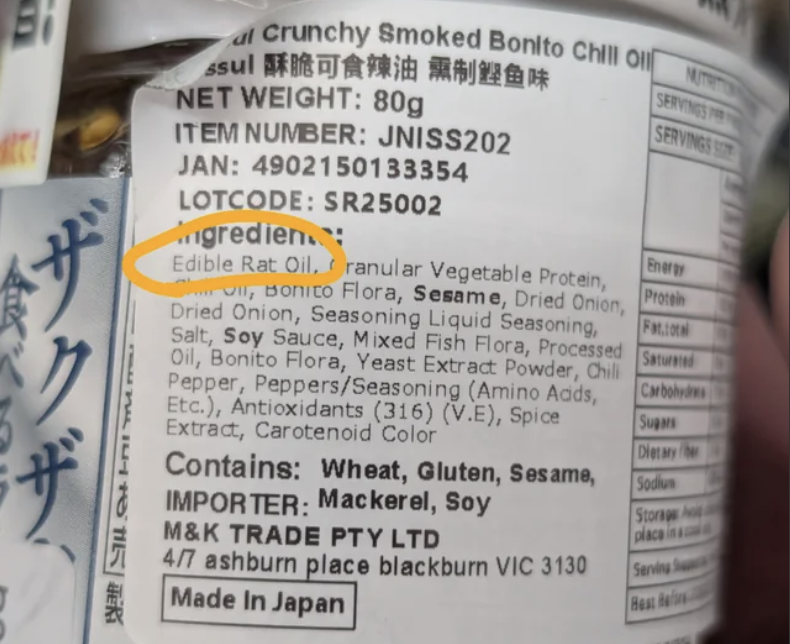
There's something delightfully unpredictable about wandering the aisles of your local Asian grocer.
Between discovering new flavours and trying to decipher unfamiliar packaging, you never quite know what surprise might be waiting on the shelves.
For one curious Aussie shopper, that surprise came in the form of a chili oil bottle with an ingredient list that would make anyone do a double-take. The first ingredient? 'Edible rat oil.' Not exactly what you'd expect to drizzle on your dumplings.
The same label also listed soy sauce, salt, and sesame among its ingredients — making the mysterious 'rat oil' stand out even more.
In this article
The discovery that broke the internet
Fair trading laws and food laws in Australia require that labels do not misinform consumers through false, misleading or deceptive representations, and the Food Standards Code requires that labels must be legible and prominent in English. But sometimes, even the best intentions can go wonderfully awry.
The social media user user who spotted this peculiar ingredient list couldn't help but share their find with the online community.
'I'm always curious if these translated food labels get checked at all, doesn't seem like it in this case,' they posted, alongside a photo of the offending bottle.
The ingredient list also included other mysterious items like 'bonito flora' and 'mixed fish flora' - terms that left shoppers scratching their heads.
One commenter joked, 'It's edible though, it's fine,' while another quipped, 'Inedible Rat Oil is not a permitted ingredient.'
The mystery unraveled
Fortunately, some dedicated internet sleuths took it upon themselves to solve the puzzle. Nissui Corporation is a marine products company based in Tokyo, Japan, with 61 subsidiaries and 44 associated companies across Japan, Australia, New Zealand, Asia, Europe and North and South America.
The real culprit behind the confusion?
A classic case of lost-in-translation meets autocorrect gone wrong. Rayu (Japanese chili oil) is heated sesame oil with added chili peppers, and la-yu is a Japanese chili-flavored oil made by adding chili peppers to sesame oil.
'The product is seafood infused with chilli oil. Chilli oil is pronounced as Ra Yu in Japanese. So the most likely scenario is the importer wanted to type 'Ra Oil' and then it autocorrected to 'Rat Oil''
Another user pointed out that it was most likely ラー油 (Ra-yu, chili oil) mistranslated into Chinese and then English: 'Must've been translated from Japanese to Chinese then English since the rest of the sticker label is Chinese.'
One social media user detective cracked the case: 'I checked their ingredients on a Japanese site. First one is 'Edible rapeseed oil'. Sooo terrible mistranslation maybe?'
Rapeseed oil is one of the oldest known vegetable oils, with both edible and industrial forms produced from rapeseed, the seed of several cultivars of the plant family Brassicaceae.
The mystery 'bonito flora' was actually 'bonito flake' - a common fish product in Japanese cooking—while 'seafood flora' referred to various seafood-derived ingredients.
One commenter clarified further: 'Seafood flora is probably talking about 魚介類, a legal catch-all phrase for seafood-derived ingredients like fish oil, fish flakes, etc.'
The serious side of food labeling
While this mix-up provided plenty of laughs, it highlights a more serious issue with food labeling in Australia. Labeling non-compliance was found to be by far the most significant issue found amongst food imports in 2020, accounting for 81.3 per cent, or 2,562 out of all 3,140 cases.
Even more concerning, the number of labeling non-compliance cases increased by over 1,000 cases or some 66 per cent compared to 1,541 cases in 2019.
What the law requires for food labels in Australia
Information must be legible, prominent and in English. If a label is in another language, that's okay, but the essential information must be in English. This includes ingredients, nutritional information, and allergen warnings.
The good news is that Australia has robust systems in place to protect consumers. Fair trading laws require that labels do not misinform consumers, and the Australian Competition and Consumer Commission (ACCC) enforces the Competition and Consumer Act 2010.
Shopping smart in multicultural grocery stores
Don't let translation mishaps put you off exploring the wonderful world of Asian groceries. These shops offer incredible variety and often much better prices than mainstream supermarkets, particularly for specialty ingredients.
Smart shopping tips for international grocery stores
- Look for products with dual-language labels when possible
- Don't be afraid to ask store staff about unfamiliar ingredients
- Check use-by dates carefully—some cultures use different date formats
- When in doubt, research the brand online before purchasing
- Trust common sense—if an ingredient seems impossible, it probably is
While Chinese chili oil versions typically use neutral oils like rapeseed, Japanese rayu incorporates toasted sesame oil. High-quality oils like cold-pressed rapeseed or canola work well for these products. Understanding these cultural differences can actually make you a more informed shopper.
The cultural bridge of food
Translation errors like this one actually reveal something beautiful about Australia's multicultural food landscape. Every mislabeled jar represents someone's effort to share their culinary heritage with a broader audience, even when the language barrier creates amusing hiccups.
Online Japanese grocery shops in Sydney and Melbourne offer carefully selected valuable Japanese grocery products, carrying over 2200 items. These businesses work hard to make authentic ingredients accessible to Australian consumers, with most doing an excellent job of providing accurate English translations.
When things go wrong, speak up
If you do encounter seriously mislabeled products—particularly those involving allergens or health claims—you can report concerns to the ACCC, who accept reports where people consider a business is doing something they shouldn't do and use those reports to inform their education, compliance and enforcement work.
Did you know?
What does this mean for you?
If you find a product with concerning labeling issues, especially involving allergens or health claims, contact the Australian Competition and Consumer Commission (ACCC) on their website or through their helpline. Your report could help protect other consumers and improve labeling standards.
What This Means For You
The 'rat oil' incident might have started as a simple translation error, but it's sparked important conversations about food labeling, cultural understanding, and consumer protection. Plus, it's given us all a good laugh—and sometimes that's exactly what we need during a routine grocery shop.
Have you ever discovered amusing translation errors on product labels? Or perhaps you've found a hidden gem in the international foods aisle that's become a household staple? We'd love to hear about your multicultural grocery adventures—the funnier the better!
Original Article
https://www.kidspot.com.au/lifestyl...t/news-story/99ab37fb2c1a58eb097b1b6ed9b3ef46
Truth in labelling, weights and measures and legibility | Food Standards Australia New Zealand
Cited text: Fair trading laws and food laws in Australia and New Zealand require that labels do not misinform consumers through false, misleading or deceptive rep...
Excerpt: Fair trading laws and food laws in Australia require that labels do not misinform consumers through false, misleading or deceptive representations, and the Food Standards Code requires that labels must be legible and prominent in English.
https://www.foodstandards.gov.au/consumer/labelling/truth
Truth in labelling, weights and measures and legibility | Food Standards Australia New Zealand
Cited text: · The Food Standards Code requires that labels must be legible and prominent so they are distinct from the background, and in English.
Excerpt: Fair trading laws and food laws in Australia require that labels do not misinform consumers through false, misleading or deceptive representations, and the Food Standards Code requires that labels must be legible and prominent in English.
https://www.foodstandards.gov.au/consumer/labelling/truth
Nissui—Wikipedia
Cited text: Nissui Corporation (株式会社ニッスイ, Kabushiki-gaisha Nissui), is a marine products company based in Tokyo, Japan.
Excerpt: Nissui Corporation is a marine products company based in Tokyo, Japan, with 61 subsidiaries and 44 associated companies across Japan, Australia, New Zealand, Asia, Europe and North and South America.
https://en.wikipedia.org/wiki/Nissui
Nissui—Wikipedia
Cited text: As of 2013, the company has 61 subsidiaries and 44 associated companies across Japan, Australia, New Zealand, Asia, Europe and North and South America...
Excerpt: Nissui Corporation is a marine products company based in Tokyo, Japan, with 61 subsidiaries and 44 associated companies across Japan, Australia, New Zealand, Asia, Europe and North and South America.
https://en.wikipedia.org/wiki/Nissui
Rayu / Japanese Chili Oil | Glossary | Kikkoman Corporation
Cited text: Rayu / Japanese chili oil (ラー油 in Japanese) is heated sesame oil with added chili peppers to infuse it with the flavor and aroma.
Excerpt: Rayu (Japanese chili oil) is heated sesame oil with added chili peppers, and la-yu is a Japanese chili-flavored oil made by adding chili peppers to sesame oil.
https://www.kikkoman.com/en/cookbook/glossary/rayu.html
Homemade La-yu (Rayu Japanese Chili Oil) • Just One Cookbook
Cited text: La-yu (ラー油, 辣油), sometimes spelled as rayu or ra yu, is a Japanese chili-flavored oil made by adding chili peppers to sesame oil and heating the oil t...
Excerpt: Rayu (Japanese chili oil) is heated sesame oil with added chili peppers, and la-yu is a Japanese chili-flavored oil made by adding chili peppers to sesame oil.
https://www.justonecookbook.com/homemade-la-yu/
Rapeseed oil—Wikipedia
Cited text: Rapeseed oil is one of the oldest known vegetable oils. There are both edible and industrial forms produced from rapeseed, the seed of several cultiva...
Excerpt: Rapeseed oil is one of the oldest known vegetable oils, with both edible and industrial forms produced from rapeseed, the seed of several cultivars of the plant family Brassicaceae.
https://en.wikipedia.org/wiki/Rapeseed_oil
Labelling non-compliance: Nutrition label errors soar by 66 per cent among imported foods in Australia—government data
Cited text: Amongst all the tests conducted, labelling non-compliance was found to be by far the most significant issue found amongst food imports last year. “In ...
Excerpt: Labeling non-compliance was found to be by far the most significant issue found amongst food imports in 2020, accounting for 81.3 per cent, or 2,562 out of all 3,140 cases.
https://www.foodnavigator-asia.com/...-imported-foods-in-Australia-government-data/
Labelling non-compliance: Nutrition label errors soar by 66 per cent among imported foods in Australia—government data
Cited text: Of note here is that the number of labelling non-compliance cases has increased by over 1,000 cases or some 66 per cent compared to 1,541 cases in 2019.
Excerpt: the number of labeling non-compliance cases increased by over 1,000 cases or some 66 per cent compared to 1,541 cases in 2019.
https://www.foodnavigator-asia.com/...-imported-foods-in-Australia-government-data/
Labelling laws | NSW Food Authority
Cited text: · Information must be legible, prominent and in English. If a label is in another language, that’s okay, but the essential information must be in Engl...
Excerpt: Information must be legible, prominent and in English. If a label is in another language, that's okay, but the essential information must be in English.
https://www.foodauthority.nsw.gov.au/food-labelling/labels-law/labelling-laws
Truth in labelling, weights and measures and legibility | Food Standards Australia New Zealand
Cited text: In Australia, the Australian Competition and Consumer Commission (ACCC) enforces the Competition and Consumer Act 2010.
Excerpt: Fair trading laws require that labels do not misinform consumers, and the Australian Competition and Consumer Commission (ACCC) enforces the Competition and Consumer Act 2010.
https://www.foodstandards.gov.au/consumer/labelling/truth
Homemade Rayu (Japanese-Style Chili Oil) Recipe
Cited text: Two essential elements define its character: First, while Chinese versions typically use neutral oils like rapeseed, Japanese rayu incorporates toaste...
Excerpt: While Chinese chili oil versions typically use neutral oils like rapeseed, Japanese rayu incorporates toasted sesame oil.
https://sudachirecipes.com/homemade-rayu/
Homemade Rayu (Japanese-Style Chili Oil) Recipe
Cited text: If you can, select high-quality oils like cold-pressed rapeseed or canola.
Excerpt: While Chinese chili oil versions typically use neutral oils like rapeseed, Japanese rayu incorporates toasted sesame oil.
https://sudachirecipes.com/homemade-rayu/
Ichiba Junction—Online Japanese Grocery | Daiwa Food—ichibajunction
Cited text: Online Japanese grocery Shop in Sydney and Melbourne.
Excerpt: Online Japanese grocery shops in Sydney and Melbourne offer carefully selected valuable Japanese grocery products, carrying over 2200 items.
https://ichibajunction.com.au/
Ichiba Junction—Online Japanese Grocery | Daiwa Food—ichibajunction
Cited text: Offering carefully selected valuable Japanese Grocery products at the best prices.
Excerpt: Online Japanese grocery shops in Sydney and Melbourne offer carefully selected valuable Japanese grocery products, carrying over 2200 items.
https://ichibajunction.com.au/
Country of origin food labelling | ACCC
Cited text: We accept reports where people consider a business is doing something they shouldn’t do. We use those reports to inform our education, compliance and ...
Excerpt: you can report concerns to the ACCC, who accept reports where people consider a business is doing something they shouldn't do and use those reports to inform their education, compliance and enforcement work.
https://www.accc.gov.au/business/advertising-and-promotions/country-of-origin-food-labelling







